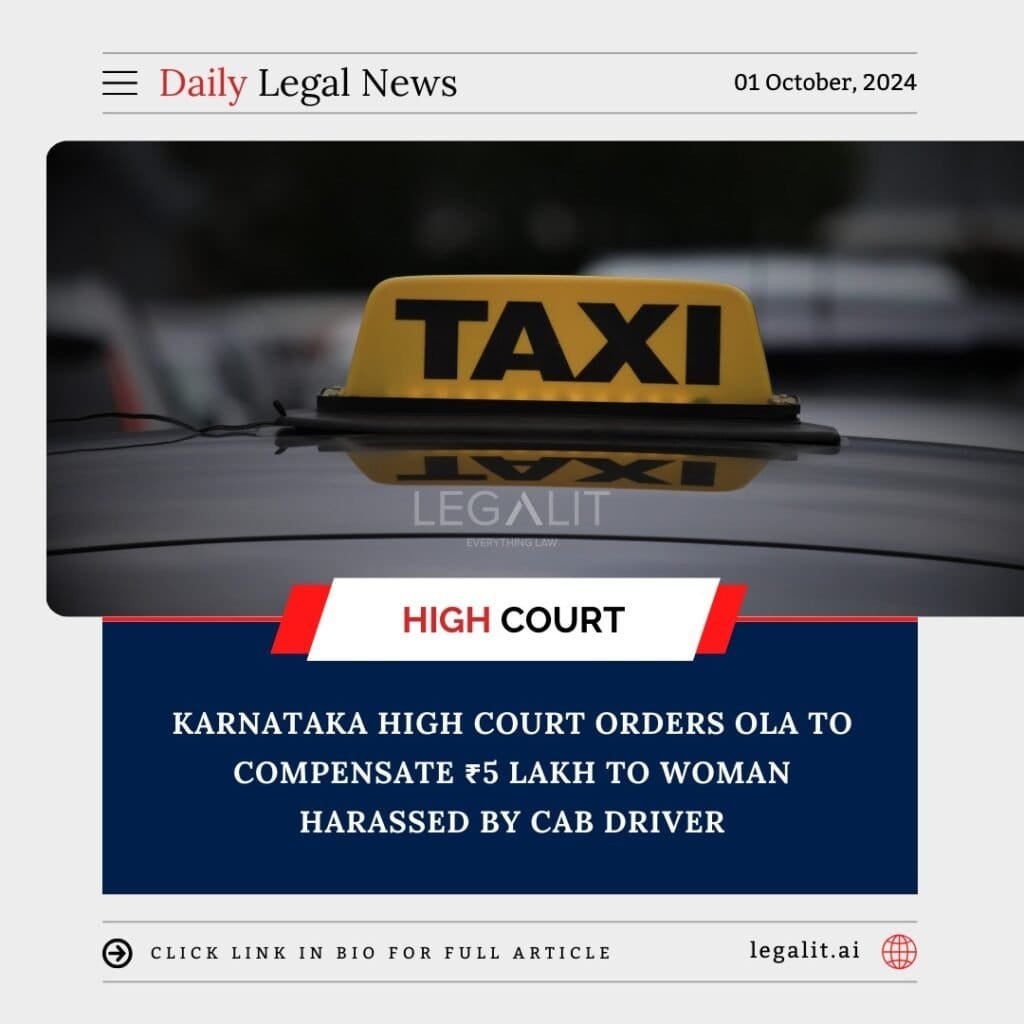
The Karnataka High Court has directed Ola, the popular ride-hailing company, to pay a compensation of ₹5 lakh to a woman who was sexually harassed by one of its drivers. The ruling emphasizes the responsibility of ride-hailing platforms to ensure passenger safety and hold their drivers accountable for misconduct. This decision serves as a critical reminder of the need for stringent safety protocols in the rapidly growing ride-sharing industry.
Background of the Case: Ensuring Passenger Safety
The incident occurred when the woman, a passenger using Ola’s services, was subjected to sexual harassment by the cab driver during her journey. The victim reported the matter to the authorities, leading to the driver’s arrest and legal action. However, the woman also sought compensation from Ola, alleging that the company failed to provide a safe transportation environment.
The Karnataka High Court’s ruling came in response to this plea, highlighting the role of ride-hailing platforms in ensuring the safety of their passengers. The Court found that Ola, as a service provider, had a duty of care to its customers and was liable for the actions of its drivers, especially when those actions violated the rights of passengers and put them in danger.
The High Court’s Decision: Compensation for Victim
The Karnataka High Court directed Ola to pay ₹5 lakh as compensation to the woman for the trauma and distress she suffered due to the incident. The Court noted that while Ola had mechanisms in place to verify drivers and monitor rides, the incident demonstrated a failure in effectively ensuring passenger safety. The compensation was ordered as a means to provide some form of redress to the victim for the ordeal she endured.
The Court underscored that ride-hailing companies have a responsibility not only to vet their drivers but also to provide a safe environment for passengers throughout the ride. This includes having effective measures in place to prevent misconduct and respond swiftly to any incidents that may arise. The Court’s decision is intended to send a strong message to ride-hailing companies about the importance of passenger safety and the consequences of negligence.
Ola’s Responsibility and the Larger Implications
The judgment has broader implications for the ride-hailing industry as a whole, especially with regard to the accountability of companies for the actions of their drivers. Ola, like other ride-sharing platforms, operates on a model where drivers are considered independent contractors rather than direct employees. However, the High Court’s ruling makes it clear that this distinction does not absolve the company of responsibility when it comes to passenger safety.
Ride-hailing platforms are expected to take proactive steps to ensure that their drivers meet certain standards of conduct and that any complaints against them are dealt with promptly and effectively. This includes thorough background checks, continuous monitoring of driver behavior, and implementing safety features such as emergency buttons and real-time tracking to protect passengers.
The High Court also emphasized the importance of responding to complaints in a timely manner and providing adequate support to victims. In this case, the victim reported the incident to Ola, but the company’s response was deemed inadequate, contributing to the decision to award compensation.
Strengthening Safety Protocols in the Ride-Hailing Industry
The ruling highlights the need for ride-hailing companies to strengthen their safety protocols and ensure that passengers feel secure when using their services. Companies like Ola and Uber have introduced several safety features over the years, including SOS buttons, driver verification processes, and ride-tracking capabilities. However, incidents like this one indicate that more needs to be done to prevent such occurrences and ensure that drivers who engage in misconduct are held accountable.
One of the key aspects of passenger safety is driver screening. The Court’s decision serves as a reminder that background checks should be thorough and continuous, rather than a one-time process. Ride-hailing platforms should also provide training to drivers on appropriate behavior, customer service, and how to handle emergency situations.
Another critical area is the response mechanism for complaints. Passengers should have easy access to report issues, and companies must ensure that complaints are addressed swiftly and effectively. Providing adequate support to victims of harassment, such as counseling services and assistance in filing police complaints, is also crucial in demonstrating a commitment to passenger safety.
Conclusion
The Karnataka High Court’s directive to Ola to compensate ₹5 lakh to the woman who was sexually harassed by a cab driver is a significant ruling that underscores the responsibility of ride-hailing companies to ensure passenger safety. The Court’s decision highlights the need for stringent safety measures, effective driver screening, and a robust response system for addressing passenger complaints.
For Ola and other ride-hailing platforms, this ruling serves as a wake-up call to reassess their safety protocols and ensure that they are doing everything possible to protect passengers from harm. By holding companies accountable for the actions of their drivers, the High Court has reinforced the principle that passenger safety must be a top priority, and any failure in this regard will have serious consequences.